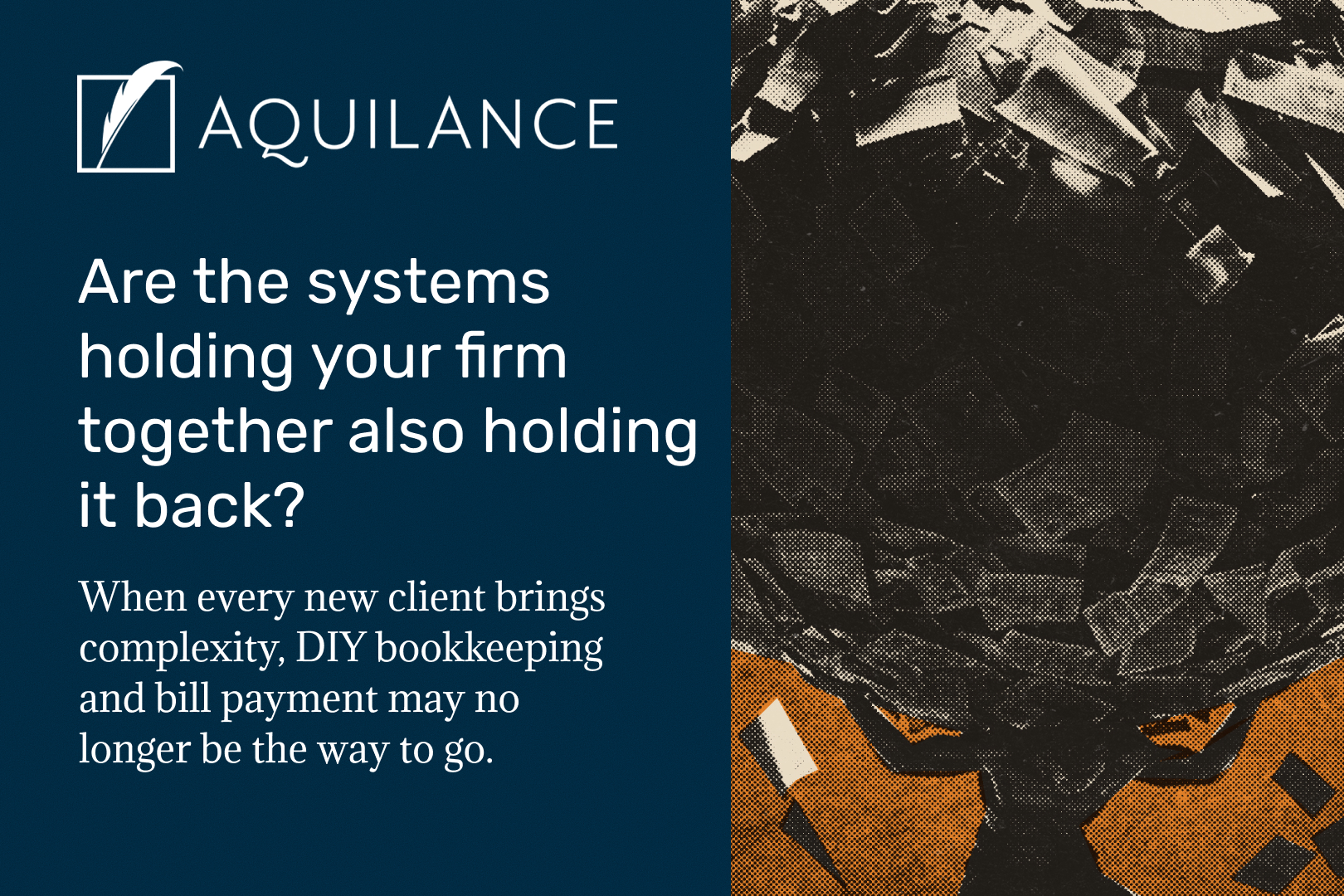Summary
DIY bill payment can appear to work when a financial advisor has only offered it to a couple of clients. A good client associate can handle bill payment for a couple of clients off the side of their desk. But as your firm scales and clients become more complex, patchwork systems create risk, inefficiency, and client dissatisfaction. Here are five signs that show it is time to move beyond spreadsheets and adopt a solution built for scale.
When DIY Stops Being Enough
A client calls because a utility bill for their vacation home went unpaid. The team scrambles to figure out whether it was missed, paid twice, or still sitting in someone’s inbox (or, even worse, what if the paper bill dropped behind a desk). Spreadsheets are open across three monitors. Receipts sit in email folders that no one has checked. Advisors who should be preparing for reviews are instead untangling transactions.
Sound familiar?
For many firms, this is how manual client bill payment and bookkeeping looks once the business grows. What worked for a few clients with simple needs no longer holds up for complex households with multiple properties, entities, and trusts. The cracks begin to show, and clients who once tolerated stopgap systems now expect polish and precision.
Here are five clear signs your firm has reached the point where do-it-yourself bookkeeping is no longer serving you or your clients.
1. Bookkeeping Consumes Advisor Time
The Kitces Report (Vol. 2, 2024) reveals that advisors spend over 40% of their time on low-value administration work and spend only 25% directly with clients.
This means that even with team support, too many hours are lost reconciling bills, tracking down receipts, or updating spreadsheets when they should be focused on activities that drive growth.
Every hour lost to reconciling bills or chasing receipts is an hour not spent:
- Advising clients
- Strengthening relationships
- Growing the firm
If your advisors are bogged down by back-office work, bookkeeping has become a bottleneck, and it’s already holding you back.
2. Errors and Oversights Are Slipping Through
When bookkeeping is handled “off the side of the desk,” mistakes become practically inevitable. Duplicate payments, missed entries, or uncategorized expenses might seem minor, but to clients, they signal inaccuracy.
As clients add homes, entities, and trusts, the number of transactions multiplies. When advisors or support staff are stretched too thin, details start falling through the cracks. What families expect is a dedicated process, with people whose full focus is on keeping their financial life precise. Without that level of attention, confidence erodes quickly.
3. Client Expectations Are Outpacing Delivery
It’s no secret that the expectations of high-net worth clients are rising, with many looking for RIAs with services such as bill payment, consolidated reporting, and detailed cash flow insights. And yet, it’s far less common for firms to consistently deliver these offerings.
If your team scrambles to assemble reports before every review meeting, or if the information you provide lacks the clarity clients want, expectations are not being met. Families with significant wealth now see clean, timely reporting as a baseline requirement, not an add-on. Firms that fall short risk being seen as reactive, while those that meet the standard position themselves as indispensable.
4. Compliance and Security Concerns Are Rising
Managing sensitive client data through email, spreadsheets, or shared drives creates unnecessary exposure. Privacy regulations are tightening, cyber risks are increasing, and improvised systems are rarely built with safeguards in mind.
Bill payment also introduces regulatory considerations. Under the SEC’s custody rule, even simple activities like making payments on behalf of clients can trigger compliance obligations if not structured correctly.
Affluent families expect their financial life to be handled with the same care as their investments. When processes lack security or controls, the firm carries the liability and clients begin to question whether their advisor can keep pace with the standards they deserve.
5. Growth Is Stalling Instead of Scaling
Early on, every new client feels like progress. More capital to manage, more referrals, more opportunity for the firm. Over time, however, the profile of those clients shifts. Households come with multiple properties, nested entities, and a steady stream of bills and reconciliations. What once created momentum now introduces drag.
The irony is that success itself becomes the source of strain. Each new win adds more weight to systems already stretched thin. Instead of celebrating growth, the team braces for the operational challenges that accompany it. Without scalable support, the very clients that should propel the firm forward risk slowing it down.
The Bottom Line: Execution Defines the Experience
Bill Payment is no longer just a back-office function. It’s become part of the client experience. Families measure a firm not only on planning and advice, but also on the precision of execution.
The firms that thrive are those that:
- Free advisors from administrative tasks
- Deliver clean, consolidated data
- Provide real-time financial clarity
If you recognize these signs, your firm has already outgrown your current in-house process. The next step is to adopt a system designed to handle scale with security, accuracy, and professionalism.
Aquilance exists to make that transition seamless. We empower advisors to give their clients the experience of a family office without adding internal overhead.
Ready to see how Aquilance can transform your back office into a strategic advantage? Feel free to book a private workshop. We’d love to help.
About Aquilance:
Aquilance is run by a team of executives with deep financial services expertise, as well as a dedicated employee base with 10-year-plus tenures at Aquilance. Our team is deeply devoted to providing the ultimate white-glove service to the families and advisors we partner with. The longevity of both client relationships and employee tenure underscores our dedication to client needs and commitment to their continued success. This is equally beneficial for financial advisors, tax accountants, estate planning attorneys, and other professionals who rely on these services to advise clients.
Aquilance provides transparency into family finances through personal bookkeeping and securely managed bill pay using proprietary technology and best practices, multi-entity accounting across a family’s trusts, holdings, and investment entities, including complex partnerships, and may also include payroll services, assistance with insurance review, and much more.
Each client family is paired with a dedicated relationship manager and team to manage onboarding and design of a personalized roadmap for long-term success. This team-based, tech-enabled approach ensures nothing sis missed, offering clients and their professional advisors a comprehensive view of their financial matters. All of this is underpinned by a level of personalization that is deeply ingrained in the firm’s 37-year history.






